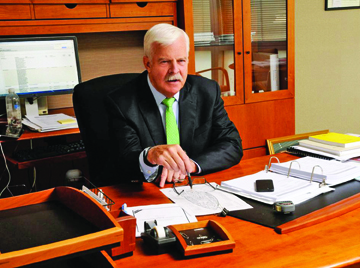
by Mark Smiley | Dec 17, 2018 | General Featured
Revenue, Cost, Liabilities Not Fully Accounted For; City
Pays From Agency Funds Rather Than Workers’ Comp
According to a new audit released in late October by Denver
Auditor Timothy M. O’Brien, CPA, the city is not reporting up to 10% of its
workers’ compensation costs — approximately $3 million during the three-year
audit period — in the proper fund. More: Because the actuaries do not have all
the cost information, some of the liabilities associated with workers’
compensation are not recorded at all.
“The city should account for all workers’ compensation costs
in the designated fund, so we know what the self-insured program is actually
costing the people of Denver,” Auditor O’Brien makes clear.
State law requires employers to provide medical care and
treatment needed at the time of the injury or occupational disease and during
the disability. The city’s workers’ compensation activity is accounted for
primarily in a dedicated fund.
Salary Deemed Benefit
However, the audit found revenues, costs and liabilities are
not fully accounted for in the dedicated fund. Specifically, salary
continuation costs are not paid out of the dedicated fund. Instead, these costs
are paid directly by the agency without recording all related liabilities in
any fund.
Salary continuation is when the city provides paid
disability leave to eligible employees if the employee has a disability due to
an on-the-job injury or disease and is unable to perform the duties of the
position or any other position. Salary continuation begins after an employee
misses three days and files a workers’ compensation claim.
The city considers salary continuation to be a benefit and
pays for it out of individual agency funds rather than the Workers’
Compensation Fund. This matters because it means the city is underreporting the
total cost to the city of workers’ compensation in the city’s Comprehensive
Annual Financial Report. The city has agreed to add disclosure of salary
continuation costs and related liability to the 2018 financial statements.
Lacks Formal Plan
The city also lacks a formal strategic plan process for the
workers’ compensation program. Without comprehensive and targeted measures tied
to well-documented strategy, the city cannot determine if the self-insured
program is cost-effective and achieving strategic goals. More evaluation of
different workers compensation models could help ensure that the city has
identified all available cost savings opportunities.
“While the program’s performance has improved in many
aspects, the city is not fully analyzing the total cost of the workers
compensation program,” Auditor O’Brien said. “Without reviewing performance,
how can the city know it’s getting the best deal? Reducing unwarranted costs is
a primary goal.”
Finally, the balance policy for the city’s workers’ comp
claim fund does not match the actuary’s recommendation. The city uses a
third-party firm to calculate the fund’s liability and to make a recommendation
on how much above that liability the city should be able to pay due to the
uncertainty of claims. The workers’ comp fund has a target funding range $1
million below the actuary’s recommended level.
Puzzling City Decision
Auditor O’Brien questions this decision because the city has
more funds on hand than the recommended levels, but the agency disagrees and
chooses not to consider a policy to require the funds stay at the recommended
level.
“Given that the funding levels have greatly improved, I find
it puzzling for the city to have more money on hand than needed but not
consider making it policy to keep at least the actuarial recommended amount
available,” Auditor O’Brien said.
The audit also found room for improvement in updated polices
and in efficiency and effectiveness of the risk management information system.
City’s Watchful Eye: Denver City Auditor Timothy M. O’Brien,
CPA, is the watchdog keeping Denver business dealings straightforward and
trustworthy. His latest audit just released reveals the city is not reporting
up to 10% of its workers’ compensation costs — approximately $3 million during
the three-year audit period — in the proper fund.
Workers’ Comp Costs: City considers salary continuation to
be a benefit and pays for it out of individual agency funds rather than the
Workers’ Compensation Fund.
Paid Disability Leave: Salary continuation begins after an
employee misses three days and files a workers’ compensation claim.

by Mark Smiley | Dec 17, 2018 | Travel
Brilliant Young Minds Ages 12-29 Dream Up New Products In
Science, Energy, Retail And Food
by Glen Richardson
A 29-year-old who makes funny, cute T-Shirts for geeks,
nerds and pop culture lovers and a 22-year-old who makes non-dairy, high
protein, low sugar bars and cookies have made Forbes’ 2019 “30 Under 30”
feature that annually draws attention to the top young entrepreneurs in the
U.S. and Canada.
Ramy Badie’s Denver-based TeeTurtle — whose apparel, toys
and games are licensed characters for Disney and Marvel — was expected to
generate $20 million in 2018 revenue. Daniel Katz’s high-protein and low-sugar
No Cow candy bars are in 15,000 stores nationwide and recorded $10 million in 2017
revenue.
Also making the list is Joel Jean, a cofounder of Swift
Solar, a startup manufacturing lightweight solar panels that are cheaper and
more efficient than conventional panels. Finally, the list includes Denver
student Gitanjali Rao, winner of the 2017 Discovery Education 3M Young
Scientist Challenge. Now 12, she invented a quick, low-cost test to detect
lead-contaminated water.
Designed To A Tee
During his first year in medical school, 29-year-old Ramy
Badie entered a T-shirt design contest to win money for tuition. He ended up
dropping out of school to found TeeTurtle. He is the winner in Forbes’ Under 30
Retail and Ecommerce category.
No matter what the product line, creator Badie’s
undertakings are always about the design. As an example, to fund production of
a card game about Unicorns he set out to raise $10,000 to fund production of
the game on Kickstarter. He reached his goal in just 71 minutes and collected
more than $1.8 million for the project. Support from more than 30,000 backers
was more than every other project on the fundraising website at the time.
On TeeTurtle’s website Badie explains the company this way:
“We are a bunch of kids at heart having a great time because every one of us is
passionate about what we do and we believe in the company and the product.”
A No Cow Footprint
When Daniel Katz dropped out of college after just three
months in 2013 to hawk his own line of energy drinks, his intense selling
schedule found him eating protein bars instead of real meals. But whey protein
upset his stomach, and gave him a new product idea: a high-protein but
low-sugar and non-dairy bar. The Denver-based company has raised $100,000 in
funding from blue chip investors like General Mills’ venture capital arm 301
Inc.
The rapidly growing distribution footprint of No Cow — with
offices on Blake St. in LoDo — has products in more than 15,000 stores across
the country including GNC, Vitamin Shoppe, CVS, Sprouts, and Wegmans.
After initially moving the business to his hometown of
Cincinnati, Katz relocated his growing startup to Denver, due to the physically
mindful attitudes of Colorado consumers. “People here are active, they’re
happy, they’re on trend,” says Katz. “And that’s who we represent as a brand.”
Solar Cells Shine
As a Ph.D. student at MIT, Joel Jean, was a member of a
research team that developed record-thin and lightweight solar cells. As a
co-founder of Swift Solar, he aims to develop lightweight, flexible, and
efficient solar panels using metal-halide perovskite materials.
Prior to joining Swift, he served as Executive Director of
the Tata-MIT GridEdge Solar research program, which focuses on scale-up of new
solar photovoltaic technologies for India and other developing countries.
As a researcher and NSF Fellow at MIT, he developed ultra-lightweight
and flexible solar cells that were recognized by the Katerva Award in 2017. He
co-authored the MIT Future of Solar Energy Study and has worked extensively on
emerging PV materials and devices, techno-economic analysis, and energy and climate
policy. Jean, 29, holds a PhD and SM in electrical engineering from MIT and a
BS with distinction from Stanford University.
Getting The Lead Out
As an 11-year old school girl Gitanjali Rao took the top
prize in the 2017 Young Scientist Challenge for her lead-detection device,
which is capable of finding lead in drinking water with the aid of a mobile
app. As the winner of the Young Scientist Challenge she won $25,000. Now 12,
she is using the prize money to refine the device so it can be sold commercially.
She was selected from 10 finalists who spent three months
collaborating with scientists to develop their ideas. Her device uses carbon
nanotubes to detect the presence of lead. Thousands of U.S. water systems are
reportedly contaminated by lead. Until now, testing reliably for lead was
expensive and meant sending away samples for analysis.
But Gitanjali’s portable invention — named Tethys, after the
Greek goddess for fresh water — allows a sensor linked to a mobile app to give
an accurate, almost immediate analysis via a mobile app. “If you take a shower
in contaminated water, you do get rashes and that can easily be studied by an
epidemiologist,” she explains. “And if somebody drinks lead in their water,
their children might have small, minor defects.”
Playing His Cards Right: Ramy Badie’s TeeTurtle was expected
to generate $20 million in 2018. To fund production of this Unicorns card game
he set out to raise $10,000 on Kickstarter. He reached his goal in 71 minutes
and collected more than $1.8 million for the project.
No Cow Candy Man:
Daniel Katz’s high-protein and low-sugar
No Cow candy bars are in 15,000
stores nationwide and recorded $10 million in 2017 revenue.
Bright Breakthrough: A cofounder of Denver’s Swift Solar,
Joel Jean was a member of the research team at MIT that developed record-thin
and lightweight solar cells.
Youthful Inventor: Gitanjali Rao’s lead-detection device
finds lead in drinking water with the aid of a mobile app. The Young Scientist
Challenge winner is using the $25,000 prize money to refine the device so it
can be sold commercially.





